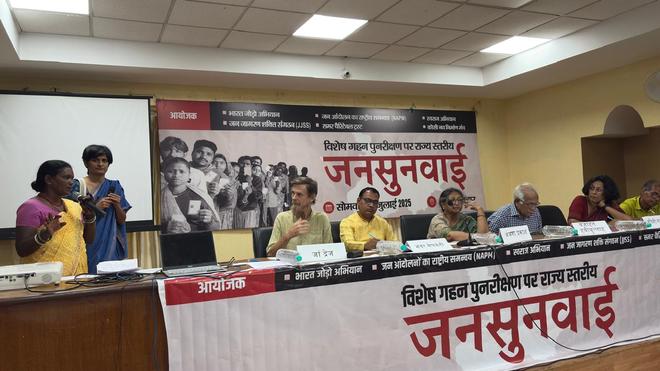A damning public hearing held in Patna on Monday has revealed alarming irregularities in the ongoing Special Intensive Revision (SIR) of electoral rolls in Bihar, prompting a panel of eminent citizens to call for its immediate cancellation, reported the Hindu.
Organised jointly by civil society organisations including Bharat Jodo Abhiyan, Jan Jagran Shakti Sangathan, National Alliance of People’s Movements (NAPM), Samar Charitable Trust, Swaraj Abhiyan, and Kosi Navnirman Manch, the hearing brought together voices from 14 districts who reported widespread violations and procedural lapses.
The panel consisted of well-known personalities such as economist Jean Drèze, former Patna High Court judge Anjana Prakash, former Chief Information Commissioner Wajahat Habibullah, Delhi School of Economics professor Nandini Sundar, former director of A.N. Sinha Institute of Social Studies Dr. D.M. Diwakar, and Forward Press founder Bhanwar Meghwanshi.
Illiterate voters reported having to pay ₹100 to get help in filling the required forms. “I had to sell my ration rice and walk 4 km to get a passport-sized photo. I went hungry for two days,” said Phool Kumari Devi, a labourer from Katihar. Others, like Ram Chandra Prasad from Nalanda, said they received no acknowledgement after submitting their forms, raising concerns about whether their entries would be included at all.
Several attendees testified that their forms had already been submitted without their knowledge or consent—sometimes without even collecting their signatures. In Patna, Nirmal Kumar alleged that his family members were threatened by officials when they raised objections.
Adding to the irregularities, enumeration forms were reportedly distributed not by designated Booth Level Officers (BLOs), but by ward councillors, anganwadi workers, and even sanitary staff. Many households received forms for only a few members, leaving others excluded.
Jean Drèze questioned the clarity and purpose of the SIR exercise. “Even after reading the 20-page ECI notification, the objective of this revision remains unclear. But the impact is obvious: it will disenfranchise a large section of voters—especially from marginalized communities,” he stated, citing a Bharat Jodo Abhiyan survey that showed 37% of people lacked the necessary documents.
He insisted that the process was not just flawed, but fundamentally impractical and discriminatory. “This cannot be fixed with modifications. It needs to be cancelled altogether,” Drèze declared.
Other panelists echoed his concern. Anjana Prakash highlighted the near-impossible documentation requirements for rural citizens. Wajahat Habibullah warned that the Election Commission appeared to be creating hurdles for voters rather than facilitating participation. Nandini Sundar and Dr. Diwakar both emphasized that democracy itself was at risk if such practices continued unchecked. “This is a threat to the ideals enshrined in the Preamble of the Constitution,” added Bhanwar Meghwanshi.
The testimonies and findings from the Jan Sunwai are expected to fuel ongoing legal battles, as NGOs have already moved the Supreme Court challenging the SIR process. With Bihar heading toward assembly elections in 2025, the issue has drawn national attention, especially over fears that the revision may be used to target specific communities and suppress opposition voters.




